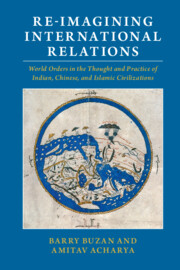 Re-imagining International Relations
Re-imagining International Relations 6 - Conclusions
Published online by Cambridge University Press: 02 December 2021
Summary
This chapter reviews the three case studies in terms of six areas of comparison: power politics, hierarchy, peaceful coexistence, international political economy, territoriality/transnationalism, and modes of thinking. It observes a spectrum with China and hierarchy at one end, Europe and anarchy at the other, and India and the Islamic world in between. It notes how the thinking and practice of the past are as relevant in the three case studies as they are in Europe and charts out the similarities and differences among the cases, how they compare with Western IR, and how this provides the foundations for a more pluralist, global discipline of International Relations.
Keywords
- Type
- Chapter
- Information
- Re-imagining International RelationsWorld Orders in the Thought and Practice of Indian, Chinese, and Islamic Civilizations, pp. 113 - 160Publisher: Cambridge University PressPrint publication year: 2021
